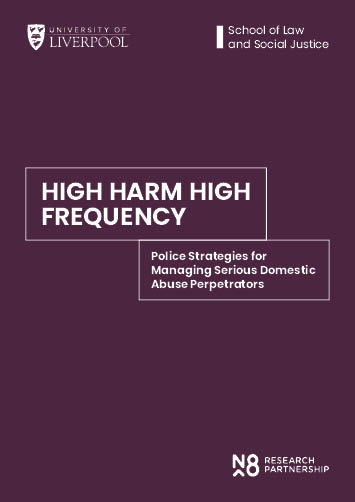Strategies for disrupting high risk high harm domestic abuse
Police strategies for managing serious domestic abuse perpetrators.
Domestic abuse makes up a significant proportion for police business (more than 20% of crime incidents for each force). There were over 17,000 domestic abuse incidents in Cheshire in 2020. Within this figure lies a smaller number of high-harm, high-risk serial domestic abuser offenders. This group are responsible for a significant amount of repeat offending (against the same or different victims) in many cases recorded over a number of years.
Domestic abuse continues to be a high priority for N8 policing partners, and the search for cost-effective, perpetrator-focussed, and victim-centred strategies is essential.
This project, awarded £21.1k from the N8 Policing Research Partnership as part of the N8PRP Small Grant Fund, partnered with Cheshire Police, and was further supported by South Yorkshire Police, North Yorkshire Police, Lancashire Police, and Cumbria Police.
The project, led by Professor Barry Godfrey, Professor of Social Justice, University of Liverpool, as Principal Investigator; Dr Jane Richardson, Department of Sociology, Social Policy, and Criminology; and Professor Sandra Walklate, Eleanor Rathbone Chair of Sociology, University of Liverpool, ran from April 2022 – May 2023.
Researchers analysed various strategies used by Cheshire and other police forces to disrupt the criminal careers of high-harm high-frequency (HHHF) domestic abuse perpetrators. By analysing the strategies police forces implemented, the researchers were able to explore which worked most effectively in terms of reducing re-offending in HHHF. This carried important implications for managing offending behaviour, improving victim-survivor engagement, and reducing operational policing costs.
Since the publication of the report, recommendations made have been implemented by both Merseyside and Cheshire Police which will increase the focus on the most serious perpetrators. This will allow the research team to conduct further analysis and evaluation following the implementation, which in turn will provide valuable case studies for other collaborating police forces.
This followed the release of the Government’s Strategic Policing Requirement in February 2023, which introduced violence against women and girls as an additional national threat, with clear expectations for how local and regional police capabilities tackle violence against women and girls, and how local forces work with others. Considering in 2022 in Cheshire alone, there were 21,059 domestic abuse incidents, of which 17,154 were crime, this report is key in developing policing strategies to reduce re-offending in HHHF domestic abuse offenders.
The study identified good practice regarding the management of HHHF offenders with mental health problems; however, given there is a strong correlation between HHHF domestic abuse and mental health/illness, the recommendation was also made for improved co-ordination between mental health services and HHHF management processes. There are data gaps in current policing practice, which slows down the identification of those with criminal careers, giving more opportunity to reoffend. The report recommended streamlined practices across forces, especially concerning entry and maintenance of HHHF databases. The data-analytical processes of identifying serious perpetrators requires refinement to make it easier to curb offending trajectories, manage offenders and reduce re-offending, particularly in relation to HHHF domestic abuse.
- Download the High Harm High Frequency Report 2023 (PDF, 210.3KB)
